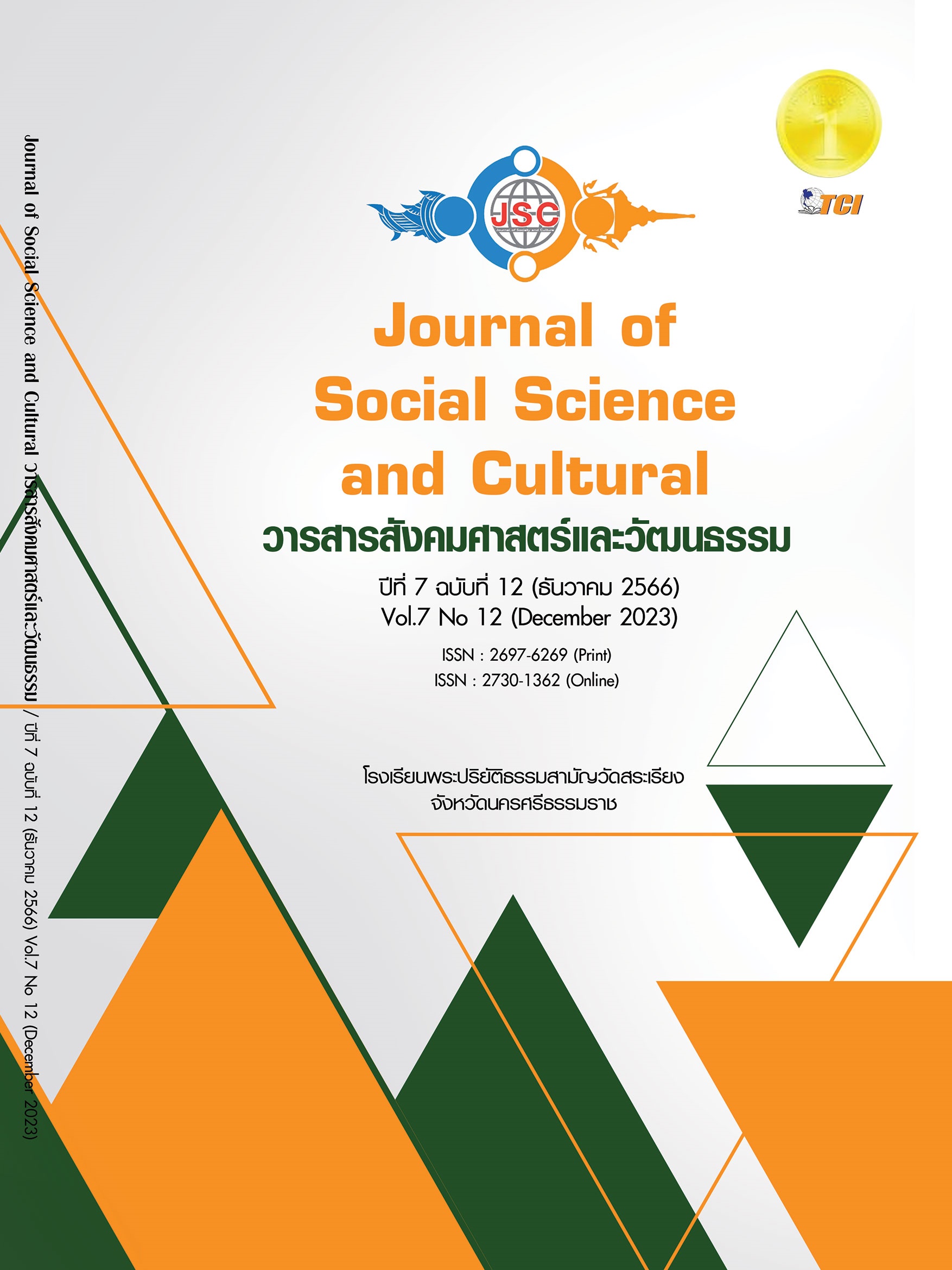THE SCENARIO OF LEARNING MANAGEMENT FOR PROMOTING MATHEMATICAL COMPETENCIES OF STUDENTS IN COMPULSORY EDUCATION LEVEL IN THE NEXT DECADE (2022-2032)
Main Article Content
Abstract
This research objectives are to (1) study of mathematics learning management in Thailand and highly successful countries in mathematics, (2) study the scenario of learning management to promote the mathematical competency of students in compulsory education in the next decade (2022-2032), and (3) create policy proposals of learning management to promote the mathematical competency of students in compulsory education in the next decade (2022 - 2032). By using the Ethnographic Delphi Futures Research (EDFR) technique. Key informants composed of 17 experts. The research was divided into three phases: 1) was a study of mathematics learning management in Thailand and highly successful countries in mathematics. 2) studied the scenario of learning management to promote the mathematical competency of students in compulsory education in the next decade (2022 - 2032). and 3) created policy proposals of learning management to promote the mathematical competency of students in compulsory education in the next decade (2022 - 2032). Data were collected using interviews and questionnaires and analyzed using content analysis. The results of the research found the following: (1) mathematics learning management in Thailand and other highly successful countries had consistent elements of learning management as learning management goals and organizing learning activities, measurement and the evaluation of learning outcomes; (2) the scenario of learning management to promote the mathematical competency of students over compulsory education over the next decade (2022 - 2032) consisted of three main components, 10 subcomponents and 114 items. Every item had a median as five and an interquartile range value from 0.00-1.00; and (3) policy proposals regarding learning management to promote mathematical competency of students in compulsory education in the decade (2022 - 2032) divided into three areas, totaling 45 proposals and evaluation results at the highest level ( = 4.52, S.D. 0.50)
Article Details
References
ไพฑูรย์ สินลารัตน์. (2526). องค์ประกอบของการเรียนการสอน.เอกสารการสอน ชุด วิชาการสอนภาษาไทย หน่วยที่ 1-8. (พิมพ์ครั้งที่ 3). นนทบุรี: มหาวิทยาลัยสุโขทัยธรรมาธิราช.
ไพศาล หวังพานิช. (2526). การวัดผลการศึกษา. กรุงเทพมหานคร: ไทยวัฒนาพานิช.
ศุภลักษณ์ ทองจีน. (2560). เอกสารประกอบการสอน การออกแบบและการจัดการเรียนรู้. อุดรธานี: ศูนย์การศึกษาบึงกาฬ มหาวิทยาลัยราชภัฏอุดรธานี.
สำนักงานเลขาธิการสภาการศึกษา. (2559). รายงานผลการศึกษาการพัฒนามาตรฐานการศึกษาของต่างประเทศ. สิ่งพิมพ์ สกศ. อันดับที่ 37/2559. กรุงเทพมหานคร: 21 เซ็นจูรี่ จำกัด.
สำนักงานคณะกรรมการการศึกษาขั้นพื้นฐาน. (2560). มาตรฐานการเรียนรู้และตัวชี้วัด กลุ่มสาระการเรียนรู้คณิตศาสตร์ วิทยาศาสตร์ และสาระภูมิศาสตร์ในกลุ่มสาระการเรียนรู้สังคมศึกษา ศาสนา และวัฒนธรรม (ฉบับปรับปรุง 2560) ตามหลักสูตรแกนกลางการศึกษาขั้นพื้นฐาน พุทธศักราช 2551. กรุงเทพมหานคร: โรงพิมพ์ชุมนุมสหกรณ์การเกษตรแห่งประเทศไทย จำกัด.
สุมน อมรวิวัฒน์. (2543). “การเรียนการสอนที่เน้นกระบวนการ” ในเอกสารการสอน ชุด วิชาการสอน กลุ่มสร้างเสริมประสบการณ์ชีวิต หน่วยที่ 1-7. กรุงเทพมหานคร: ป.สัมพันธ์การพิมพ์.
Arias O. E. et al. (2020). Learning-Mathematics-in-the-21st-Century-Adding Technology to the Equation. Retrieved April 25, 2020, from https://publications.iadb.org/en/learningmathe matics-in-the-21st-century-adding-technology-to-the equation
Mevarech, Z. & B Kramarski. (2014). Critical Maths for Innovation Societies: The Role of Metacognitive Pedagogies, OECD Publishing. Retrieved April 19, 2020, from http://dx.doi. org/10.1787/9789264223561-en
Ministry of Education and Research. (2014). National curricula for basic schools. Retrieved April 17, 2021, from https://www.hm.ee/en/national-curricula - 2014
Ministry of Education Singapore. (2012). Mathematics Syllabus Primary Ones to Six Implementation Starting with 2013 Primary One Cohort. Retrieved April 23, 2020, from https://www. moe.gov.sg
The Education Bureau HKSARQ. (2017). Mathematics Education Key Learning Area Curriculum Guide (Primary 1 - Secondary 6). Retrieved April 19, 2020, from https://www.edb.gov.hk /en/curriculum-development/kla/ma/index.html


